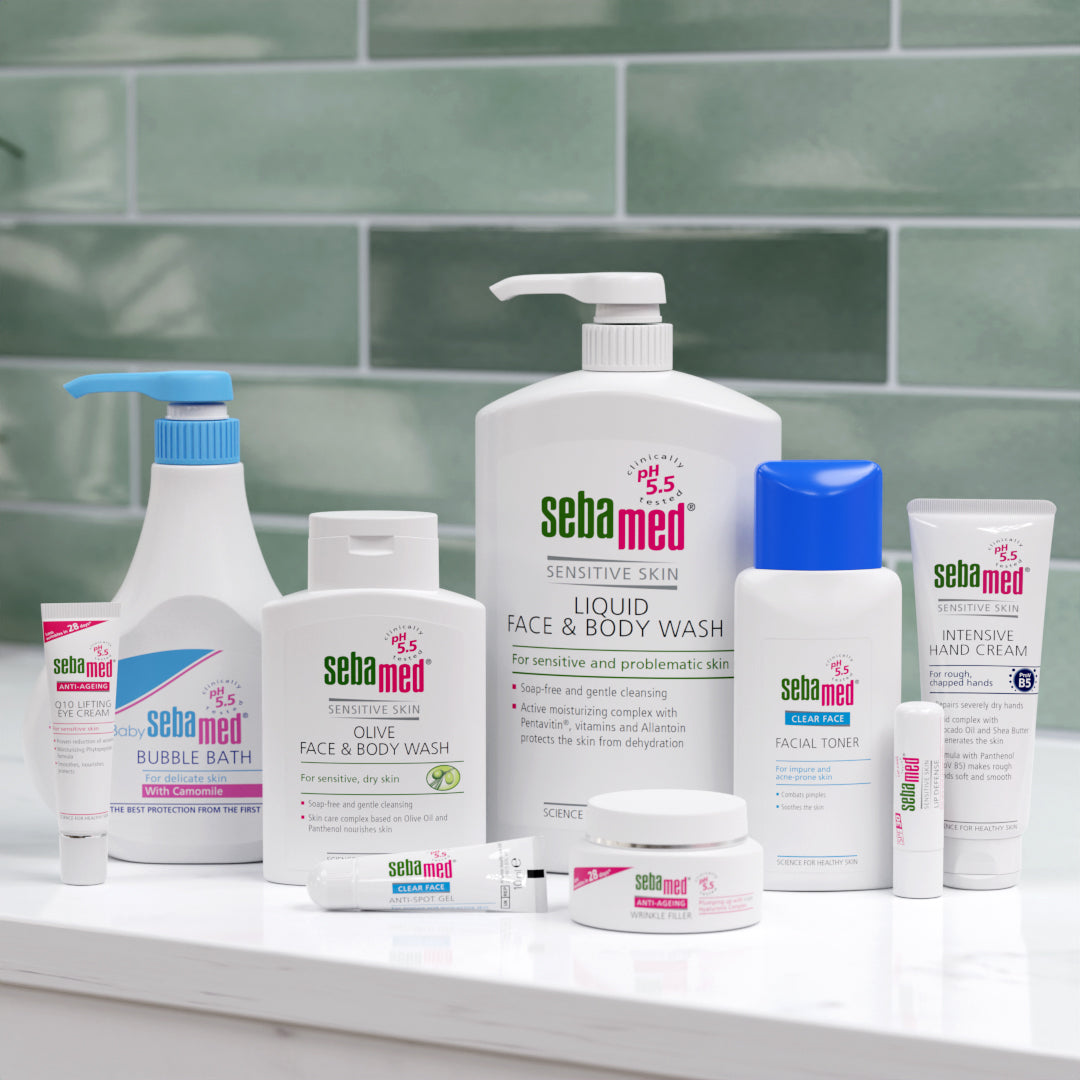Knowing your skin well and observing changes in symptoms is one of the most important steps in a good skincare routine. Many skin conditions, like acne or very dry skin are temporary and get better with treatment, whereas others, such as eczema or psoriasis can be caused by genetics and can only be managed, not cured.
Here's everything you need to know about acne, dermatitis and psoriasis...
Acne
Acne is a common skin condition that can affect people of any age but commonly occurs in teenagers and younger adults due to hormonal changes. Around 95% of people aged 11-30 years old are affected by acne to some extent.
Symptoms
Characterised by spots, oily skin, and sometimes skin that’s hot or painful, acne mainly affects three areas of the body: face, back, and chest.
Acne is caused by hair follicles that have become blocked due to the overproduction of sebum, an oily substance created by the sebaceous glands. If the blocked hair follicle is “close to the surface of the skin, it bulges outwards, creating a whitehead. Alternatively, the plugged follicle can be open to the skin, creating a blackhead.” Plugged follicles can become contaminated and infected by normally harmless bacteria that live on the skin, causing papules, pustules, nodules, or cysts.
Treatment
Recommended acne treatments vary based on the severity of the case. Acne can be managed and prevented using soap-free, deep-cleansing products, such as the Clear Face Antibacterial Cleansing Foam. The Clear Face bundle is a must-have for acne-prone skin to stay clean and healthy.
Moderate and severe cases of acne may require extra treatment from prescription medicines or a course of antibiotics.
Dermatitis (Atopic Eczema, Contact Dermatitis, and Dandruff)
Dermatitis is a general term for irritated skin - it can occur in many forms and has many potential causes. Three examples of dermatitis include atopic eczema, contact dermatitis, and dandruff.
Symptoms
Atopic eczema causes the skin to become itchy, dry, cracked, and sore. There are periods of improved symptoms, followed by ‘flare-ups’ where symptoms get worse. Eczema is most common on the hands, inside of the elbows or backs of the knees, and the face and scalp in children. You may be genetically predisposed to developing eczema if you have close family members with eczema.
Contact dermatitis occurs in response to specific triggers, such as allergies or irritants. Contact dermatitis symptoms include inflamed/irritated, blistered, dry, thickened, and cracked skin. It is most common on the hands and face but can be found anywhere on the body.
Dandruff presents white or grey flakes of skin on the scalp and within the hair, looking more noticeable in darker hair or if they fall onto your shoulders. There are many possible causes for dandruff, including eczema, contact dermatitis, tinea capitis, seborrheic dermatitis, psoriasis, or cradle cap.
Treatments
Treatments for eczema do not include a cure but easing and soothing of symptoms. Hydrating washes, moisturisers/emollients, and creams formulated to soothe eczema symptoms are great for nourishing the skin.
Contact dermatitis is normally cleared up by identifying and avoiding the triggering irritating substance. For relief and soothing, Sebamed has an array of skincare products to combat dermatitis symptoms and maintain the skin’s natural defence barrier.
If you have dandruff and an oily scalp, you can be self-treated by consistently using Anti-Dandruff Shampoo, formulated to moisturise the scalp, revitalise the hair, and remove visible signs of dandruff irritation.
However, if you have dandruff with a dry scalp, our Extreme Dry Shampoo is the perfect choice as it hydrates and moisturises the scalp to prevent dandruff from occurring,
Psoriasis
Psoriasis is a condition that causes patches of dry, red skin covered in silver scales, sometimes accompanied by itching or soreness.
Symptoms
The common types of psoriasis are plaque psoriasis (dry, red skin legions), scalp psoriasis, nail psoriasis, guttate psoriasis (drop-shaped sores), and inverse psoriasis (affecting the folds of the skin). The most common form of psoriasis is plaque psoriasis, accounting for 80-90% of cases.
Treatment
Psoriasis treatments help to keep the condition under control. From shampoo to body wash, Sebamed has a variety of products that you can use to alleviate the symptoms of psoriasis and help protect your skin. More severe cases may require additional treatment from your GP or specialist.






